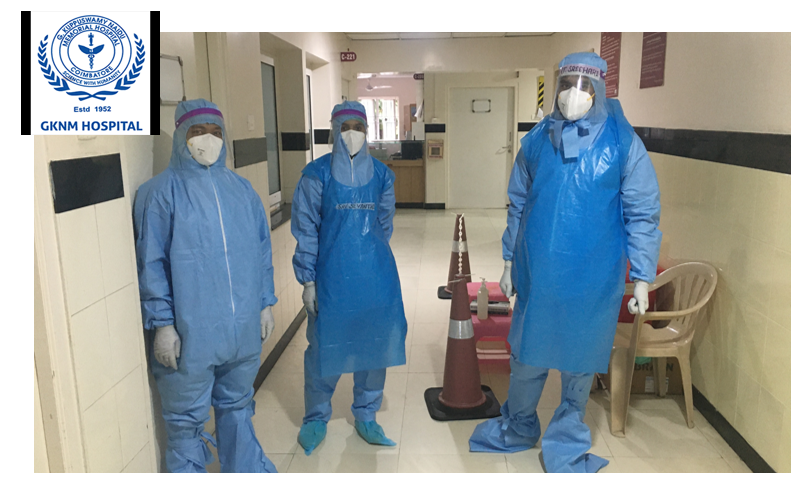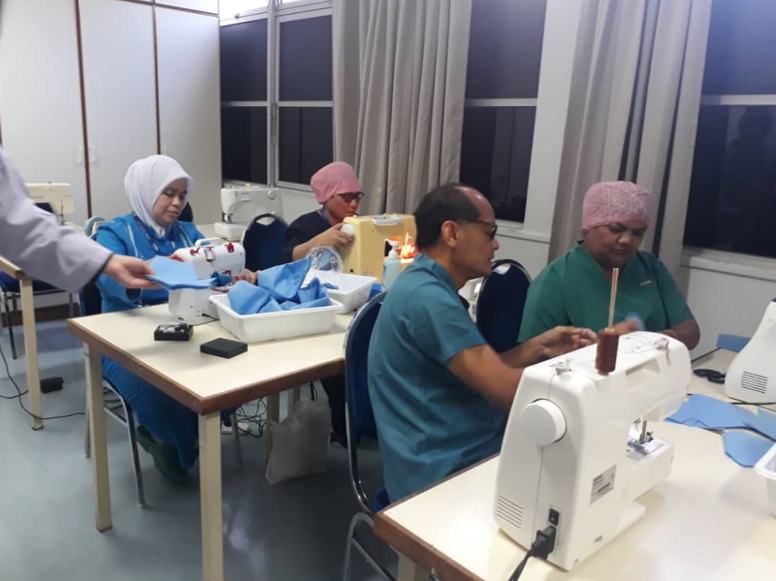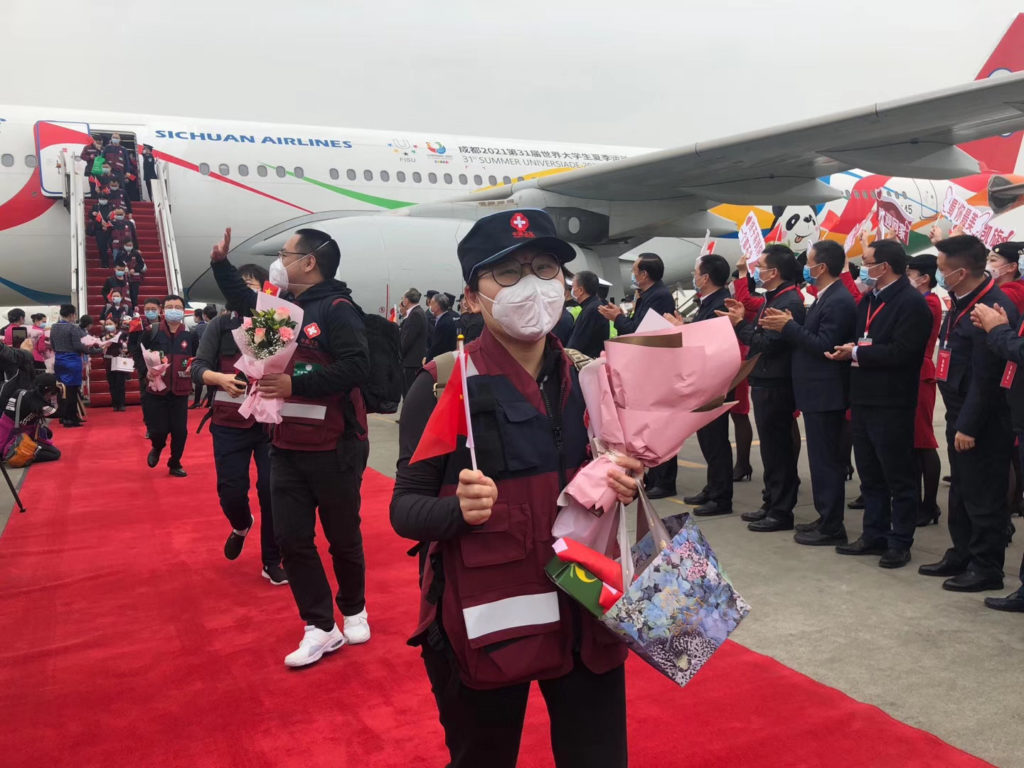We asked our global hospital partners about the effect of the pandemic on their work. Brazil and India are now among the COVID-19 epicenters, and hospitals there struggle with the challenges faced by many countries. Our partners in Malaysia and Vietnam resumed their pre-pandemic procedures after transmission of the virus slowed down. Hospitals in China have returned to normal, with some additional safety procedures for all admitted patients.
India
India currently leads all countries in the number of reported new COVID-19 cases per day, with over 60,000 reported on a daily basis. A national lockdown was declared at the end of March. Since the beginning of June, the restrictions have been eased. Our partners in Coimbatore, G. Kuppusamy Naidu Memorial Hospital (GKNM), performed only emergency surgeries until May 1st.

Medical staff at GKNM, India
COVID-19 testing is now mandatory for all patients at GKNM, and results take up to 12 hours. According to Dr. Raju Vijayakumar (Dr. Vijay), one-third of the nurses at the hospital lost their jobs because there were fewer patients having elective procedures. Among health care workers, there was also a fear of COVID-19 infection. The lockdown has presented three main challenges to patients and their families: transportation, the increasing financial burden and housing accommodations for families from a distance. “Most of these children with critical heart disease who are being referred to me live 200-300 miles away from our hospital,” says Dr. Vijay. Despite significant transportation hurdles during the country’s lockdown, Dr. Vijay’s team was able to successfully operate on a 3-month-old girl. The other two challenging surgeries were reported by The Times of India: the first surgery of its kind in India performed on a 2.2-kilogram newborn and surgery on a 1.7-kilogram premature baby.
Brazil
In Brazil, as in India, COVID-19 cases and deaths continue to escalate. The largest city in Brazil is São Paulo, where our partner Instituto do Coração (InCor) is located, and it reports the highest number of cases and deaths in the country. Pediatric cardiac surgeon Dr. Leonardo Miana says: “Elective cases were postponed in order to leave enough space and ICU beds for COVID-19 cases. At the beginning of the pandemic, we noticed a lot of alarm and stress coming from nurses, and also from some physicians and respiratory therapists, because of the fear of getting infected and infecting patients. As time passed, things got better regarding this concern.” There is sufficient protective gear and supplies at his hospital. Dr. Miana has treated numerous patients with complex heart problems during the pandemic. “The good news is that we were able to maintain good outcomes, even though we were short on staff, especially nurses,” says Dr. Maina.
Malaysia
In Malaysia, a well-coordinated response to the COVID-19 helped slow the virus and reduce the number of deaths. The country has reported over 9,000 confirmed COVID-19 cases, with 125 deaths. Although our partner Institut Jantung Negara (IJN) was not a COVID-19-designated hospital, cardiac surgeon Dr. Sivakumar Sivalingam and his center still faced some challenges, including low staff morale and an acute shortage of protective gear. IJN created a support group to improve staff morale that had been negatively impacted by COVID-19 cases among employees.

Protective equipment production at IJN, Malaysia
To ease the shortage, the hospital started producing its own face masks, face shields, gowns and hand sanitizers. The pandemic also prompted IJN to introduce telemedicine visits. And despite the closure of international borders, IJN was able to provide urgent treatment for children from the neighboring countries. A 3-week-old baby was airlifted from Jakarta, Indonesia, and underwent successful surgery.
Vietnam
Although Vietnam reported its first patient with COVID-19 in January, it has reported only 1,000 cases and 29 deaths since then. Vietnam National Children’s Hospital in Hanoi performed emergency operations only during the national quarantine in April, and the number of procedures was decreased by half. The traffic was blocked between provinces, except for emergency cases. To be able to travel, families had to receive permission from their child’s hospital. Ambulances were difficult to find or rent, and public transport was blocked. There were 25-30 patients in the hospital’s pediatric cardiac unit, compared to 100-120 patients before the pandemic. “However, staff morale was positive because they could take more time off,” says cardiac surgeon Dr. Nguyen Ly Thinh Truong. His team has resumed elective procedures, conducting an average of six surgeries a day to shorten the surgical waiting list. “We are very busy. Patients who were not operated on during the time of emergency-only cases are now coming in and are being added to the surgical waiting list.”
China
Our partners from West China Hospital report that the hospital was impacted by COVID-19 but not severely. The hospital is located in Chengdu, a city more than 700 miles away from Wuhan, where COVID-19 first emerged late last year. Once the lockdown in the country was eased in late February-early March, a majority of the hospital’s programs returned to normal operations. Currently, there are only 30-50 new daily COVID-19 cases reported nationwide. “We are lucky that the COVID-19 epidemic in China was controlled shortly after the outbreak. We are quite sure our daily life has been returned to normal now,” say our partners in Chengdu. In the early days of the outbreak, the hospital suspended most elective surgeries for a couple of weeks. After that, the volume of patients with congenital heart disease gradually returned to the pre-

Dr. Ji Peng and her team being welcomed in Chengdu upon returning from Wuhan, China
One of our partners, pediatric cardiac intensive care physician Dr. Ji Peng, was a member of the West China Hospital team that traveled to Wuhan to help care for COVID-19 patients. She served in Wuhan for 2 months before returning safely back home. Dr. Peng shares her experience in Wuhan with The BMJ.
